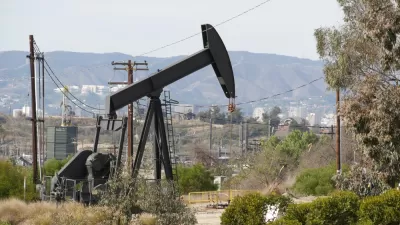Some states relied more on the most recent energy boom than others, and some prepared more for the inevitable bust. A report by the Brookings Institution recommends actions for energy states to build resilience in the face of boom and bust cycles.

An article by Mike Maciag details strategies energy states could use to weather the boon and bust cycles of their economies. After noting the recent financial troubles of Alaska, North Dakota, and Louisiana, Maciag shares news of a report recently released by the Brookings Institution, which calls on states "to rethink how they’re collecting and spending severances taxes derived from natural resources." In fact, "States can do a better job, the report authors say, of channeling oil revenues to stable trust funds that better weather the boom-and-bust cycle."
Specifically, the report "recommends that a portion of states’ annual severance tax revenues be diverted to permanent trust funds"—steps eight states have taken so far. Maciag details the experience of Pennsylvania and Ohio, "two oil-rich states that levy little or no severance taxes" and have had trouble navigating the politics of implementing new taxes.
As for states that have already established trust funds, the report "further [outlines] a series of recommendations for states that have already established trust funds," including "a solid governance framework, clear investment strategy, transparency standards and well-defined fiscal rules…"
FULL STORY: How Energy States Could Better Weather the Boom-and-Bust Cycle

Planetizen Federal Action Tracker
A weekly monitor of how Trump’s orders and actions are impacting planners and planning in America.

Maui's Vacation Rental Debate Turns Ugly
Verbal attacks, misinformation campaigns and fistfights plague a high-stakes debate to convert thousands of vacation rentals into long-term housing.

Restaurant Patios Were a Pandemic Win — Why Were They so Hard to Keep?
Social distancing requirements and changes in travel patterns prompted cities to pilot new uses for street and sidewalk space. Then it got complicated.

In California Battle of Housing vs. Environment, Housing Just Won
A new state law significantly limits the power of CEQA, an environmental review law that served as a powerful tool for blocking new development.

Boulder Eliminates Parking Minimums Citywide
Officials estimate the cost of building a single underground parking space at up to $100,000.

Orange County, Florida Adopts Largest US “Sprawl Repair” Code
The ‘Orange Code’ seeks to rectify decades of sprawl-inducing, car-oriented development.
Urban Design for Planners 1: Software Tools
This six-course series explores essential urban design concepts using open source software and equips planners with the tools they need to participate fully in the urban design process.
Planning for Universal Design
Learn the tools for implementing Universal Design in planning regulations.
Heyer Gruel & Associates PA
JM Goldson LLC
Custer County Colorado
City of Camden Redevelopment Agency
City of Astoria
Transportation Research & Education Center (TREC) at Portland State University
Jefferson Parish Government
Camden Redevelopment Agency
City of Claremont





























